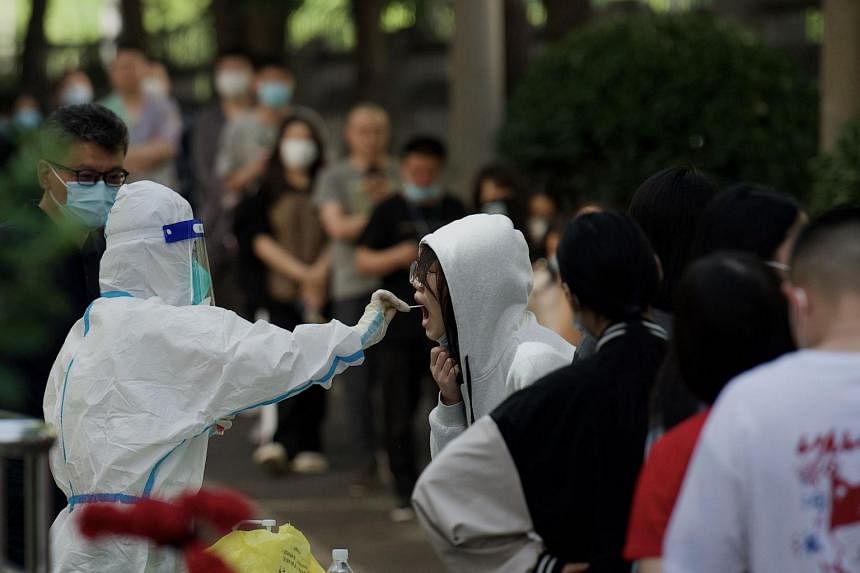BEIJING (BLOOMBERG) - The Beijing police detained 17 employees of a Covid-19 lab for failing to test samples properly, blaming the infractions for worsening the outbreak that's enveloped China's capital for a month.
Workers at the lab diluted samples to the point that infections may not be able to be detected, officials said at a briefing on Friday (May 27).
It led to cases not being found and spawned the risk of further spread, said Li Ang, an official with the Beijing Municipal Health Commission.
The city will tighten supervision over labs, including daily inspections.
Mass testing has been a hallmark of China's Covid Zero approach and officials have mobilised a legion of private diagnostic companies to help with the process.
But inaccurate results produced by some firms have led to uninfected people with false positive results being sent to makeshift hospitals in Shanghai and infections not being detected in a timely manner in Beijing.
The capital reported 29 new cases on Thursday and has seen a consistent drumbeat of infections since the current outbreak started to gather pace toward the end of April.
New cases spiked to 99 on Sunday, a record for this flareup, even as officials impose a raft of restrictions, including work-from-home orders for most Beijing districts.
Still, officials said Friday the outbreak was coming under control, with all cases detected in the 24 hours up to 3 pm local time found in quarantine.
Community spread is a key metric used by government officials to determine the severity of an outbreak and whether to ease restrictions. Shanghai began unravelling its lockdown after reporting consecutive days of zero cases in the community.
Premier Li Keqiang warned cadres in a rare emergency meeting on Wednesday that growth risks slipping out of a reasonable range, people familiar with the matter told Bloomberg News.
Local officials throughout China were given a list of objectives to focus on this year, including better balancing the containment of Covid with economic growth.
On the ground in the mega-city, anxiety over the social costs of wide-ranging curbs is also mounting.
The city's health commission on Friday set up a task force to investigate an incident of a person who died due to delayed treatment, after claims from his family that an ambulance took too long to arrive due to Covid controls.
Shunyi district officials have suspended relevant staff at the medical emergency centre and vowed that treatment would not be delayed for anyone, they said.
Anger over the incident is spreading on social media platforms, echoing similar episodes in Shanghai and Xi'an where Covid restrictions prevented timely medical care, resulting in deaths.
Local officials have faced growing unhappiness and pushback from residents over the harsh rules, posing a challenge to President Xi Jinping's staunch deployment of the strategy nationwide. In Shanghai, there were 264 new cases on Thursday, according to CCTV, all in quarantine facilities.
The city of 25 million is slowly emerging from an intensive, almost two-month lockdown that disrupted manufacturing and business, while keeping residents confined to their homes.
People are still being subjected to a range of curbs on their movement, as authorities strive to prevent a return of cases in the community.
China is struggling to balance its need to hit a growth target of about 5.5 per cent this year with its steadfast adherence to a Covid approach that is becoming less tenable as the rest of the world opens up and more transmissible virus variants take hold.
The country's borders remain effectively closed, all cases and their close contacts are put into government isolation and consistent, sometimes disruptive mass testing remains a key part of the Covid playbook.
Profits at Chinese industrial firms shrank last month for the first time in two years amid Covid outbreaks and lockdowns.
The country has fallen to second-last in Bloomberg's Covid Resilience Ranking of the best and worst places to be in the pandemic, as outbreaks trigger curbs on mobility and the functioning of business and everyday life.
Tianjin, a key port city close to Beijing, is fighting an outbreak.
The city centre was locked down this week as cases flared.
Tianjin reported 18 new infections for Wednesday, according to state broadcaster CCTV.
And health officials warned that infection risk in its vast northeast region is growing after cases were found in cities bordering North Korea.











